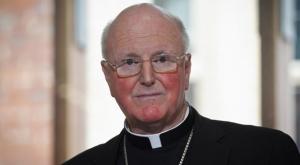“Jesus is the reason for the season.” I keep hearing it: the older cliched version of the culture wars. Yet Christians need to accept that Jesus isn’t the reason for the season, and never was.
The season of mid-winter celebration existed before Jesus was born. In the Northern Hemisphere cultures have celebrated the end of the darkening days for millennia. They have marked the winter solstice as the beginning of the period in which the days grow longer and the sun begins its half year, life giving ascent.
When ancient pagans heard the undated story of the birth of Christ they knew exactly when it had to have happened. And so they offered the Christ child their language, their symbols, and their rituals of human hope in a time of waning light and precarious life. All was re-purposed to convey more fully a truth, long hinted at, now fully revealed in the birth of Christ. New Christians intensified and completed the pagan celebrations of the solstice by associating them with the incarnation. And in doing so drew them into something universal and transcendent. Christmas was born.
It was one of the church’s finest moments of contextualization and evangelistic outreach.
So we should not anachronistically claim that this season of giving gifts and celebrating the coming of light is something that we created. First because we know it isn’t true.
Secondly because it does not do justice to God’s grace. God was there before a missionary church inserted the story of the birth of Christ into the midwinter season. God was there in all those pagan celebrations, and lights in evergreen trees, and yule logs and feasts and gift exchanges. God was there in all those human feelings roused by the desire that light once again conquer darkness. God was there in all the ways that human hearts leap with joy for the hope that is present in the birth of a child.
These were all God’s work.
And finally we should not claim we created this season because it does not do justice to the generosity of the human spirit. All the different customs from all the different countries that get wrapped up in Christmas were freely given. A sleigh riding Turkish saint, blazing fires, lights in trees, drumming and music, poinsettias and roses, queens with crowns of candles: all of these are offerings made at the cradle of the Christ Child. And each is the best gift, the richest and most meaningful, that any culture could offer. None has been despised and none should be. The Christian church should be welcome everything that the nations of the earth have brought to Bethlehem in a two thousand year procession following behind the Magi from the East.
It remains for us as American Christians, enriched in our celebration of Christmas by all of those generous peoples and cultures, to make our own best contribution in this day and time. And we are seeing it happen. We are seeing it as from coast to coast a growing number of us refuse to hear the strident voices of a fearful minority, refuse to listen to bigoted governors channeling their inner Herod, and as Americans we fling open our doors and hearts to refugees.
Each time a family is settled in this Christmas season those pillars of American culture: generosity toward those fleeing persecution and defiance of tyrants at home is woven into the fabric of our Christmas celebrations. These acts add a new theme: one with which many Americans who themselves came to this land as refugees resonate. Welcoming a refugee makes the story of the birth of Christ a little more our story, and a little more complex and thought provoking than it has usually been for us.
Maybe in the coming years Christmas in America will be more than a melting pot of the cultural traditions of our ancestral cultures. Maybe as a season to welcome refugees it will take on a distinctly American tinge. And perhaps a thousand years from now Christians will say let’s celebrate that old custom from long ago America – and welcome a stranger into our native land.











